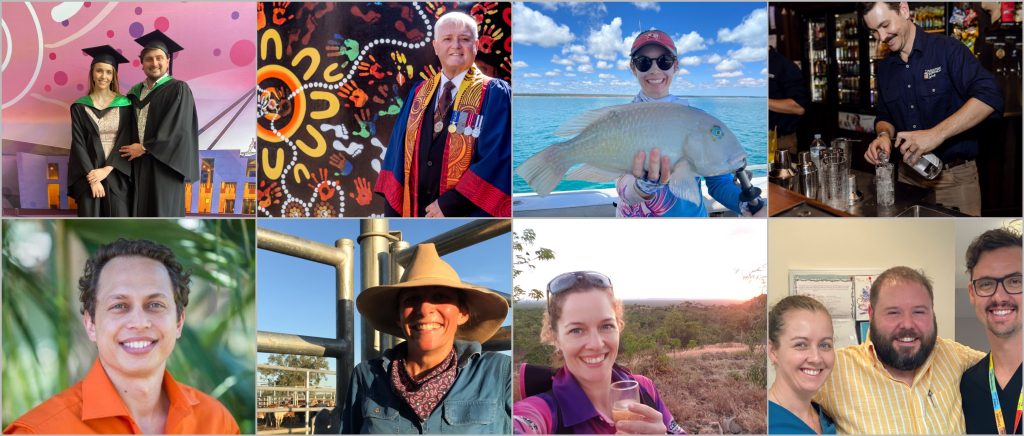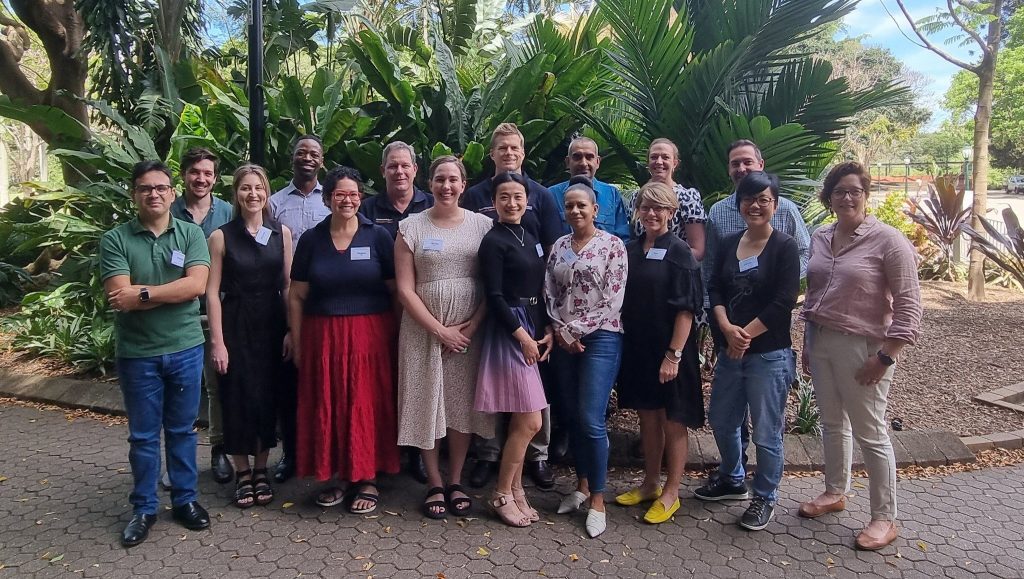
Congratulations on attaining your Rural Generalist fellowship. What an achievement! Whether you are a new fellow or have been a Rural Generalist for some time, we want to support you in your transition from trainee to RG, from learner to leader.
The QRGP is pleased to offer a dedicated Alumni Program which has been designed to engage, develop, and support you. On this page you will find information on how you can get involved with the QRGP, available workshops, professional development and mentorship opportunities, resources to help you in your practise and community, and tips on wellbeing and longevity.
Get Involved
There are many ways for our Alumni to get involved with the QRGP.
Alumni Advisory Group
The QRGP Alumni Advisory Group meets bi-monthly to discuss the hot topics and concerns in the Alumni space. If you are interested in joining as a member of the advisory group, please contact us. Alternatively, if you have an item you would like discussed at the next meeting, please email the team and we can put you in touch with a member.
Marketing and promotion
The QRGP are always seeking Alumni to feature in our marketing and promotional activities. This includes everything from workshop facilitation to student and junior doctor career information sessions to content features like Faces of RG and our blog. If you would like to be involved, share your Rural Generalist story, or have an interest in blog feature writing, please reach out.
RG Connect Newsletter
The QRGP team distributes a quarterly newsletter exclusively for our Alumni. If you would like to contribute to an upcoming edition, our team would love to hear from you.
If you haven’t received RG Connect recently, please email the team to update your contact details.
Professional Development
Cognitive Advanced Skills Training | Maintenance of Professional Standards (MOPS) Guide
The QRGP team have developed a guide book that outlines suitable activities for Maintenance of Professional Standards for the cognitive advanced skills disciplines of internal medicine, paediatrics, and mental health.
It outlines the requirements of CPD for MOPS and provides discipline specific suggestions on activities, resources and placements that we hope is of use in developing your annual Professional Development Plan.
If you’ve attended a great event that you think would be useful for others, please let us know.
The Australian College of Rural and Rural Medicine (ACRRM)
The ACRRM CPD framework is designed to meet the needs of Rural Generalists (RGs), rural and remote doctors, General Practitioners (GPs), and most other health practitioners. The framework considers the activities you are already undertaking, to help you reach your annual CPD requirements. You can view the Program here.
The Royal Australian College of General Practitioners (RACGP)
The RACGP offers a dedicated CPD Program which is included in annual membership fees. You can view the Program here.
The QRGP team are working on delivering a range of workshops and events for our Alumni. We will provide updates throughout the year through RG Connect.
Overview
The QRGP is pleased to offer the inaugural two-day Fresh Fellows Summit.
The summit is designed specifically for Senior Medical Officers who obtained FACRRM or RACGP-RG in recent years. Click here to learn more about what you can expect from attending the summit from Rural Generalist Training Advisor and workshop lead Dr Ebonney van der Meer.
Program Dates
The program will be held in Cairns on Thursday 21 March 2024 and Friday 22 March 2024.
Program Topics
The program will be delivered by our QRGP team and Rural Generalist faculty, covering:
- Skills for thriving as a recently fellowed RG consultant
- Reflective practice and CPD
- Supervision and management skills
- Rurally contextualised case-based discussions
- Procedural skill refreshers in obstetrics, anaesthetics, mental health and skin cancer
- Peer-level support and networking
Attendance requirements
Please review or seek clinical roster leave approval prior to applying.
Course fees
- Course fees will be covered by QRGP
- Accommodation is booked and paid for by QRGP where required
- Participants are responsible for booking and self-funding all other accommodation and travel costs
- Participants are required to pay for all other costs incurred, including meals and transfers not provided during the workshop
Application
Applications for the 2024 summit will close Friday 2 February 2024. Click here to register.
For more information, please contact the team today.
Overview
QRGP’s Alumni Committee cordially invites you to our first ever RG alumni social! Think casual catch ups with friends old and new, delicious food and harbour views. Families and partners welcome.
Location and Date
Where: Salt House, Cairns from 6:00pm
When: Friday 22nd March 2024
How to register
Please register your attendance here or email rural_generalist@health.qld.gov.au, by 1 March 2024.
The 2024 calendar of events is coming!

We often get asked by trainees to put them in contact with someone who’s ‘been there, done that’. Becoming a mentor to a junior doctor is a fantastic way to give back. It provides you with the opportunity to inspire and challenge the next generation of trainees to become a good rural doctor, whilst reflecting on your own rural generalist journey.
Mentoring is a mutually beneficial relationship between a mentor and a mentee which facilitates growth and knowledge transfer to better each party’s practise. A mentor is not a supervisor, direct medial educator, or academic scholar. It is a support role which provides confidential, culturally safe, and non-biased support to a mentee.
The mentor receives:
- Personal fulfilment: Serving as a mentor can be personally rewarding, and mentors witness the growth and progress of their mentees, knowing they have contributed to their success.
- Reflection and renewed perspective: Mentoring provides an opportunity for mentors to reflect on their own practices and gain new insights from the mentee’s fresh perspectives.
- Skill refinement: Explaining concepts and teaching others can enhance the mentors teaching and community skills, benefiting their interactions with patients and colleagues.
- Reinforcement of knowledge: Teaching and guiding others reinforces the mentor’s knowledge and expertise, keeping them sharp and up to date.
- Enhanced leadership abilities: Mentorship fosters leadership qualities as mentors guide and inspire mentees to become skills and compassionate rural doctors.
- Strengthening the rural health workforce: Mentors play a crucial role in shaping the next generation of rural doctors, contributing to the strength and sustainability of rural healthcare.
Pre-requisites to be a mentor
- A mentor must be an experienced Rural Generalist with the capacity to provide advice and support to a mentee.
- A mentor must be prepared to meet with their mentee on a regular basis at mutually arranged times.
- Must keep all interactions and conversations with their mentees as confidential, unless permission is sought from a mentee to involve third parties.
- Provides advice in good faith, with recognition that all information provided on training requirements must be verified by the mentee with their training organisations before acting on the advice.
If you are interested in becoming a mentor to a junior doctor, please contact the team. You can also be an informal or casual point of contact for trainees if you’d like.
There are many resources available to support you post fellowship.
The QRGP has a dedicated wellbeing page for all trainees and Alumni. You can find the page here.
Your RGTA is still available and willing to assist you post fellowship. If you need support, guidance, or even a friendly chat, get in contact with them. They would love to hear from you. If you need help contacting your RGTA, please contact the team and we will put you in touch.
The QRGP team, in collaboration with other training partners, has collated and mapped advanced skill training positions and rural vacancies to help trainees and fellows make informed career decisions. Our AST maps could be found here.
We coordinate the Rural and Remote Jobs List – the only centralised list of rural and remote vacancies in the state.
The 2024 Rural and Remote Jobs List is available here.
Take a look at the rural and remote employment opportunities our trainees and Fellows are currently pursuing.

